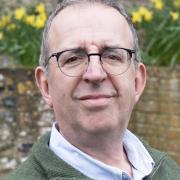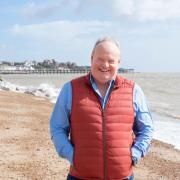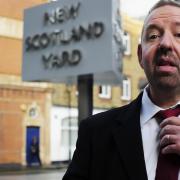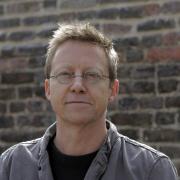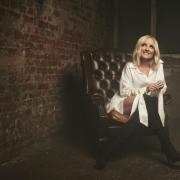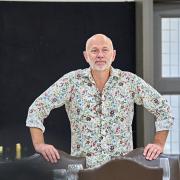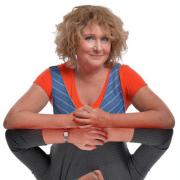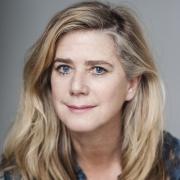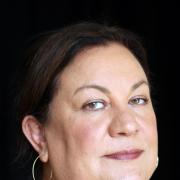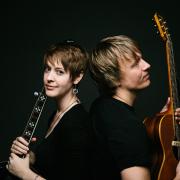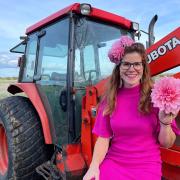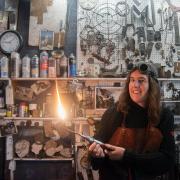Catherine Larner talks to author Helen Macdonald, Suffolk resident and winner of the Costa Book of the Year prize, about how a young goshawk helped her through the grief of losing her father

It’s a story Helen Macdonald felt compelled to tell.
Eight years ago, overcome with grief by her father’s sudden death, she became obsessed with training one of the most challenging of birds of prey. She kept a journal, writing “as a way of stitching sense back into the world” and, as time went on she realised that what was happening had a deeper meaning.
Her presentation of the experience, melding memoir, biography, history and naturalist diary to explore love and loss, mourning and death, has created a breathtakingly beautiful and powerful book called H is for Hawk. It has topped the bestseller lists and continues to accumulate awards and acclaim at every turn, including the 2014 Costa Book of the Year prize.
“It’s been a lovely shock,” Helen says of the reception to the book. “Obviously I was hoping that people would read it. But I had no idea it would be so popular. One reader said it was a book for anyone who’s ever suffered a loss or is wanting to escape from their life – so I suppose that is pretty much everybody.

“I wanted to be unflinchingly honest about how it felt to be in that dark place when you have lost someone you have loved.
“People have responded to that, but also people love wild things and the countryside, and I think that is another reason why the book has been received as it has.”
Helen’s father was Fleet Street photographer Alisdair Macdonald, whose sudden death in 2007 unleashed in her profound grief and depression.
She responded by travelling to Scotland, where she handed over £800 for a young goshawk. She returned to her home in Cambridge with one of the biggest, deadliest and scariest birds of prey. She named her Mabel and determined to train the bird by herself.

Helen was not inexperienced with birds of prey, but the task was daunting, exhausting and all-consuming. It was also, ultimately, liberating.
“There is this long, long tradition in many cultures that hawks are somehow connected to the divine. I was flying her to try and escape being human, to escape grief and loss, but of course she was hunting, so I found myself up close with death on a daily basis, as she caught rabbits and birds. It was a real education on how the world works.”
Helen talks openly about coping with bereavement.
“I think you have to lash yourself to the mast and wait. It’s like a storm you’re going through. It controls you. You just have to hang on and eventually all the grief, all the brokenness will turn back into love, and this is what happened to me for Dad.”

Helen didn’t start to write the book until five years after her father’s death and admits that it took courage to revisit the emotions of that time. “It was like taking a deep breath and diving into cold water to get back to that place and be the person I was writing about. There is a lot of distance between the me of now and the me in the book.”
That distance is enabling her to delight in the speaking engagements she is undertaking to promote the book. This spring she is travelling to America, Canada, Australia and New Zealand.
“Writing a book is like being a bit of a hermit, sitting at your desk, swearing, eating pizza and weeping. I’ve always been a bit of a loner and suddenly I’m zooming around the country meeting booksellers and readers and giving talks. It’s been astonishingly lovely.”
When life settles down again, Helen will return to her desk for a second book, which she says will explore more about how we use nature as a mirror for ourselves.
“The natural environment is struggling massively, the countryside is getting quieter and quieter. I think that is my subject – trying to get across the wonder of it all. People only protect things that they love. I want to help get more love out there for the countryside.”
Helen now immerses herself in the Suffolk countryside. “I have loved Suffolk since I was a kid. Every year we would go up to Southwold. It’s a landscape that has always seemed like home to me.”
She has left Cambridge for a village near Newmarket, feeling drawn to a place which is as obsessed about horses as she is about birds.
“Ironically I am horrendously allergic to horses, so whenever I go into the supermarkets there I start sneezing because there is so much horse dust around. But it’s a town which is arranged around an obsession. Pretty much everything in Newmarket is related in some way to racing and that seems very familiar to me. And it’s really friendly.”
Also being on the edge of the chalk downs and not far from Wicken Fen, Helen enjoys long evening walks relishing the setting and watching fenland birds.
Unfortunately Helen no longer has a hawk. Sadly Mabel died of an infection, and Helen’s current lifestyle doesn’t allow for the dedication needed to look after a hawk. Instead she keeps a parrot.
“My friends tell me a parrot is emotionally much healthier. It’s very cuddly compared to a goshawk, but obviously it doesn’t catch me dinner.”




